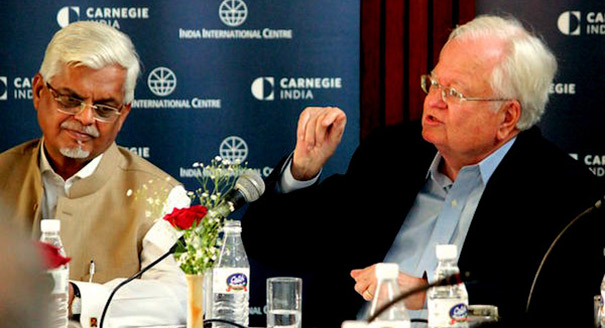Registration
You will receive an email confirming your registration.
In a rapidly evolving global landscape that is unforgiving of military misadventures, there is an urgent need for policymakers in both India and the United States to strengthen the instruments of economic diplomacy.
Carnegie India hosted Ambassador Robert D. Blackwill at a round-table discussion on the subject of his new book, War by Other Means: Geoeconomics and Statecraft, coauthored with Jennifer M. Harris. Dr. Sanjaya Baru, senior fellow at the Centre for Policy Research and director for geoeconomics at the International Institute for Strategic Studies, chaired the roundtable. Policymakers, members of the strategic affairs community, senior editors, and representatives of the media attended.
Blackwill, who served as U.S. envoy to India during 2001-03, was in New Delhi to receive the Padma Bhushan, India’s third highest civilian award. He is currently the Henry A. Kissinger Senior Fellow for U.S. Foreign Policy at the Council on Foreign Relations.
Discussion Highlights
- Importance of Definitions: Although geoeconomics is as old as statecraft, the lack of an agreed definition has undermined a common understanding of it, Blackwill explained. He explained that his new volume fills the gap by putting geoeconomics in the broader context and offering a clear definition: geoeconomics, according to him, is “the practice by which economic instruments are used to accomplish geopolitical objectives.”
- America’s Lost Tradition: While history is replete with examples of the United States using geoeconomics, this tradition was lost in recent decades in the new preference for hard military power, participants said. At the same time, Russia and China moved in the opposite direction, often seeking to utilize economic tools to undermine U.S. power. Blackwill argued that America’s continual “reach for the gun rather than the purse” has tilted the geoeconomic playing field against the United States, resulting in a structural disadvantage Washington may find difficult to reverse.
- The Trans-Pacific Partnership: Blackwill expressed dismay at the failure of American politicians to defend trade agreements like the Trans-Pacific Partnership (TPP), which would greatly facilitate the pursuit of U.S. geostrategic goals. He argued that the TPP was envisioned by Washington as serving to rebalance the Asian strategic environment, by boosting the economic development of U.S. allies in the region like Japan. The TPP, he said, is a good example of an economic instrument being utilized to achieve key geopolitical objectives. However, the current political environment in Washington makes this impossible by failing to recognize it as a tangible manifestation of geoeconomics, Blackwill added.
- Pakistan: Blackwill expressed bewilderment over what geoeconomic incentives might drive U.S. support for Pakistan. He deemed Pakistan a “dramatic example of the failure of American foreign policy,” as successive administrations have made the same mistakes repeatedly while still expecting different results. In contrast, Blackwill added, China’s policy in Pakistan is based on the clear objective of keeping India preoccupied with its neighbor and preventing India’s rise as a great power that could potentially challenge China’s dominance in the region.
- China’s Economic Leverage: Panelists discussed China’s frequent use and clear understanding of geoeconomic policy. However, some participants argued that China’s brand of geoeconomic statecraft is often coercive. This, they said, is best exemplified by the South China Sea crisis. Despite China’s efforts over the past two decades to persuade Southeast Asian countries that the economic incentives it offered were benign, the crisis worked against China’s own interests in the region and nudged apprehensive states to respond by altering their geopolitical leanings.
- India’s Challenge: Participants said that India has begun to reorient its foreign policy and adapt to an era defined by power projection. It was argued that under Prime Minister Modi, Delhi’s “Look East” policy has transformed into an “Act East” policy. There is a more conscious effort to mobilize external support to more rapid internal economic development of India and build purposeful military partnerships to limit Chinese power externally.
- Evolving Relationships: Participants discussed India’s deepening links with Japan, Vietnam, and Australia. They said that the Indo-Japanese economic relationship is especially important at a time when Japan seeks a reliable partner in the Asian future without depending solely on Washington’s erratic friendship. India is also trying to consolidate its natural strategic advantage in the Indian Ocean region, they added.
- Indian Geoeconomics: Blackwill questioned why India has not done more to assert itself geoeconomically when dealing with the United States. Given that India, the world’s largest democracy, is the sole counterweight to China in Asia, he stated that neither nation is taking their broader national interests into account. Blackwill said he would give both the United States and India an “F” for geoeconomics and recommended that both countries deepen their economic ties, begin to coordinate their trade policies, and strategize together on geoeconomics. Other participants agreed, asserting that it is imperative for India and the United States to focus on expanding cooperation in the economic domain, as all efforts to reinforce a balance of power in Asia depend on India’s growth trajectory. There was also a broad consensus that the U.S. must do more to support India’s integration into the global economic order, including its membership in the APEC, the forum for economic cooperation in the Asia Pacific region.
The event summary was prepared by Arushi Kumar, a research assistant at Carnegie India
